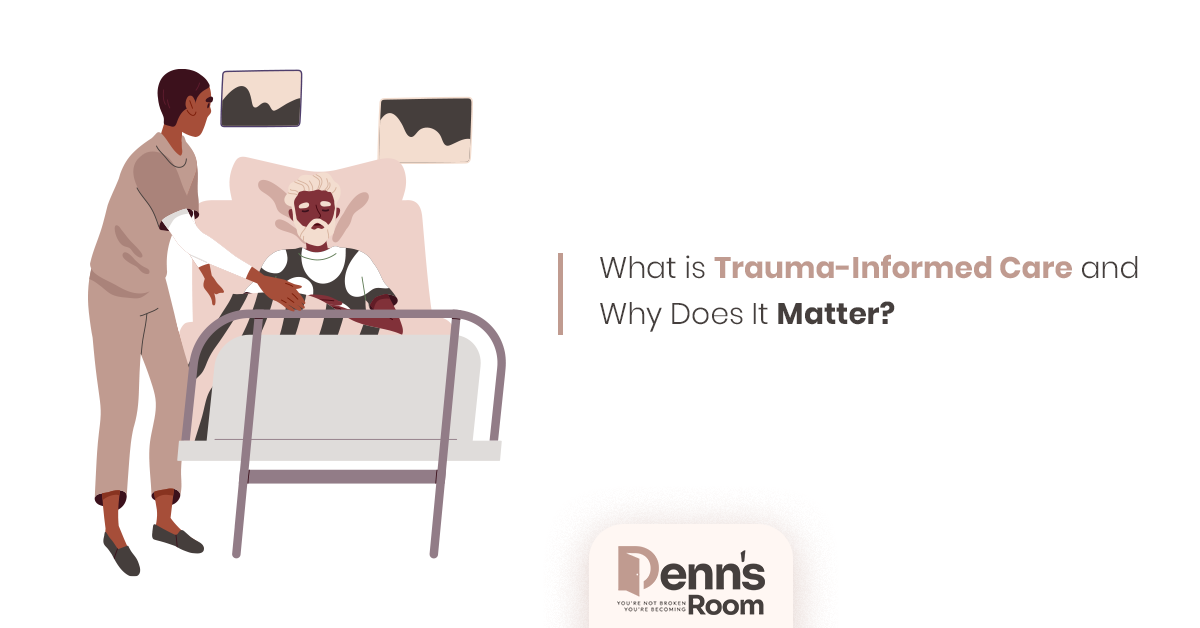Have you ever felt scared or hurt by something that happened long ago? Some things in our past can leave deep marks on our hearts. These marks are called traumas. Trauma can make it hard to trust others, feel safe, or learn new things. That is why people talk about trauma-informed care. This is a special way to help others feel better and heal. We will learn what trauma-informed care is, why it matters, and how to use it daily.
What Is Trauma?
- Trauma is when something very scary or sad happens to you.
- It can be one big event, like an accident, or many small events, like bullying.
- When your body and mind stay on “high alert,” even after the danger is gone, it is a sign of trauma.
- Kids and adults can both have trauma.
Example: Imagine you hear a loud crash and think a car hit someone you love. You feel your heart pound for a long time, even when you are safe.
How Trauma Affects Us
Feelings
- Several emotional states can endure indefinitely.
Body
- Your heart might race. Your muscles could feel tight. You may also feel tired all the time.
Thinking
- It can be tough to focus, learn something new, or decide.
Behavior
- You might act out, hide, or avoid talking to friends and family.
What Is Trauma-Informed Care?
Trauma-informed care (TIC) is a way of helping those who know about trauma and care for feelings first. It has these ideas:
Safety
- Make sure people feel safe in their bodies, feelings, and space.
- Use calm voices, soft lighting, and clear rules.
Trustworthiness
- Be honest and keep promises.
- Explain what will happen next in simple words.
Choice
- Let people choose what to do when they can.
- Offer a quiet corner or a bright room.
Collaboration
- Collaborate with the person instead of just directing them.
- Talk less and listen more.
Empowerment
- Help people see their own strengths.
- Teach skills like deep breathing or asking for help.
Cultural Respect
- Notice and honor different traditions, languages, and beliefs.
- Be open to learning from one another.
Why Trauma-Informed Care Matters
Builds Real Healing
- Fixing just the outside, like giving medicine, might not heal the heart.
- TIC looks at the whole person, mind, body, and spirit.
Stops More Harm
- Not knowing about trauma can lead us to upset or scare people again.
- For instance, making a child share their feelings before they feel safe can cause more harm.
Makes Stronger Relationships
- When people feel heard and safe, they trust more.
- Better trust means better learning, working, and playing together.
Includes Professional Help Like Therapy
- Healing from trauma often needs more than kindness and safety. It requires help from trained professionals, like therapists.
- Therapists listen and don’t judge. They show calming tools and help people grasp their feelings.
- They create a safe space to talk, grow, and heal.
Helps Everyone
- Families, schools, doctors, and friends can all use trauma-informed care.
- When a whole community uses TIC, more people feel safe and cared for.
How to Practice Trauma-Informed Care
In Schools
- Greeting: Say “Good morning” with a smile.
- Calm Corners: Create a quiet area with soft pillows and engaging books.
- Choice Boards: Let kids pick their activities and seating freely.
In Clinics and Hospitals
- Explain Steps: “First, I will wash my hands. Then I will check your arm.”
- Show Equipment: Let the person touch or see tools before using them.
- Voice Volume: Speak softly and slowly.
At Home
- Listening: Give your full attention. Nod and make eye contact.
- Safe Space: Create a corner with blankets and stuffed animals.
- Routine: Have a daily plan with meals, homework, and play.
Signs You Are Being Trauma-Informed
- You notice when someone looks uneasy or upset.
- You ask, “Do you want a break?” instead of making them continue.
- You reassure them, “You are safe here.”
- You speak kindly, even when you’re rushed.
Benefits of Trauma-Informed Care
Feelings Become Calmer
- People learn to calm their hearts and minds.
Better Learning and Work
- Less worry means more focus on reading, writing, or projects.
Fewer Conflicts
- When everyone feels safe, fights and arguments go down.
Stronger Community
- Families, schools, and neighbors help each other.
Tips for Everyone
- Use Simple Words: “I’m here to help you.”
- Watch Body Signals: Hands shaking? Take a break.
- Offer Choices: “Red or blue paper?”
- Keep Promises: If you say you will call, call.
- Learn Together: Read a book about feelings with a friend.
Moving Forward
Trauma-informed care exists as an ongoing approach to human interactions. Being with others in this approach represents a method of interaction. The approach shows us to slow down. We should listen actively and treat others with respect for their past experiences. These ideas help build safe homes, schools, and hospitals for everyone.
Conclusion
Trauma can leave big marks. But with trauma-informed care, we can help people heal. We make safe places, build trust, give choices, and work together. Using these ideas helps us grow stronger every day. A small, kind gesture can mean a lot to someone healing from trauma. We should choose to care with both our minds and hearts.
Healing from trauma takes trust and care, Denn’s Room Psychiatry is here to guide you every step of the way. Contact us today.
FAQs
Who can use trauma-informed care?
Doctors, teachers, families, and friends can all use it to help others feel better.
What can I do at home?
You can listen carefully, offer choices, and make a calm corner with pillows and books.



No comment